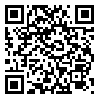Volume 7, Issue 3 (volume7, Issue 3 2019)
JCP 2019, 7(3): 74-89 |
Back to browse issues page
University of Kashan , As_Jafari@sbu.ac.ir
Abstract: (3571 Views)
Students with mathematics learning disability, because cognitive- behavioral dysfunctions, have defects in orientation and visual- spatial processing, which leads to defect in perception the spatial relationships and basic skills of mathematics. The purpose of present study was to determine the effectiveness of cognitive- behavioral plays on improve mathematics performance and perception the spatial relationships in students with mathematics learning disability. A quasi-experimental design with pre-test, post-test and a two months follow- up with control group was used. through purposeful sampling method, 30 participants who met the inclusion criteria were selected in the center of specific training of leaning disability in Zarandiyeh- Saveh and randomly assigned to two groups of cognitive- behavioral play therapy or control, n1=n2=15. Research tools were the tests of conoli’s Key math (1988) and Farastick’s perpetual- visual (1963) which were administered in three stages for two groups and the protocol of Schaefer& et al’s cognitive- behavioral play to the experimental group during nine weekly, 60- minute sessions and data were analyzed using mixed model repeated measures analysis variance. Finding showed that cognitive- behavioral play therapy had a significant effect on math performance and perception the spatial relationships of students with mathematics learning disability and this effect remained stable at follow-up. Since cognitive- behavioral play therapy likely leads to improve basic skills of mathematics, spatial awareness, visual- spatial perception, space perception, motor and orientation in students with mathematics learning disability, effect on math performance and perception the spatial relationships. Hence, it can be used as a low- cost and effective psycho educational method for improving students with mathematics learning disability.
Type of Study: Research |
Subject:
Special
Received: 2019/11/25 | Accepted: 2020/06/3 | Published: 2020/06/3
Received: 2019/11/25 | Accepted: 2020/06/3 | Published: 2020/06/3
| Rights and permissions | |
 |
This work is licensed under a Creative Commons Attribution-NonCommercial 4.0 International License. |



